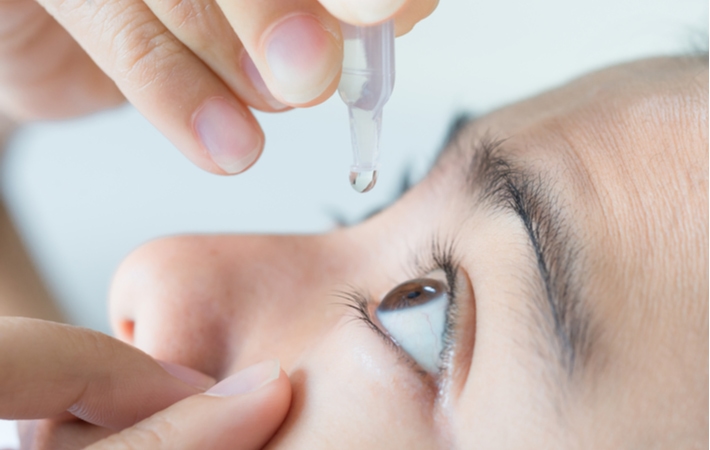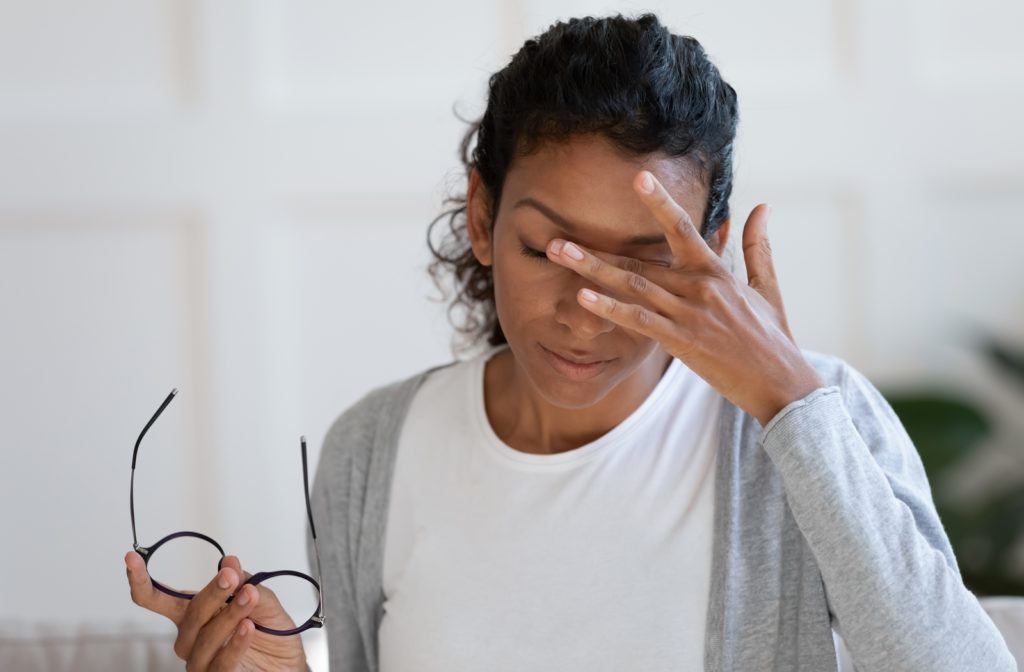Dry eyes are more than an annoyance; they can damage your eyes. It’s important to visit your optometrist if you experience any symptoms of this condition. There are many signs of dry eye disease to watch out for, but is having blurred vision one of them?
Continue reading to learn more about dry eye disease, including if dry eyes can cause blurry vision.
What is Dry Eye Disease?
Dry eye disease is a common condition where you don’t have enough quality tears to lubricate your eye’s surface. This condition is often chronic and more prevalent in older adults. Your tears are vital for keeping your eyes clean and free of debris, but complications can arise within the layers of your tear film.
Instability in your tear film can lead to inflammation and damage your eyes. There are several reasons you can develop dry eye disease.
What Causes Dry Eye Disease?
There are many possible reasons you have dry eyes. Whether the cause is internal or external, your eye doctor can determine the source of your symptoms. While dry eye can happen for many reasons, they usually relate to a decrease in tear production or an increase in tear evaporation.
Decreased Tear Production
The cause of your dry eyes may be a lack of tears. Decreased tear production occurs when you can’t produce enough aqueous fluid (water). If your glands don’t create enough tears, it can lead to discomfort and irritation.
Some of the possible reasons for decreased tear production include:
- Aging
- Medical conditions like Sjogren’s syndrome, lupus, & scleroderma
- Medications like antihistamines, decongestants, & antidepressants
- Desensitized corneal nerves
Increased Tear Evaporation
Your tears evaporate quicker when there are issues with the oily layer of your tear film. The glands in your eyelids create oil to help prevent your tears from drying out. Issues can arise and cause your tears to evaporate too fast, leading to dry eyes.
Your glands can become clogged or blocked, preventing oil from flowing out as easily. There are many possible causes if your eyes are drying out too quickly, such as:
- Meibomian gland dysfunction
- Decreased blink rate
- Eyelid conditions like entropion & ectropion
- Eye allergies
- Preservatives in eye drops
- Wind, smoke, or dry air
- Vitamin A deficiency
When you develop dry eye disease, you may experience several uncomfortable symptoms. These symptoms can affect your quality of life and vision. Many people assume these symptoms are a part of everyday life without knowing they have dry eye disease.
Other Causes
There are a few common issues that can also lead to or worsen dry eye, including:
- Contact lens wear
- Prolonged reading or other focus work
- Computer or phone usage
If you experience dry eye in these scenarios, make sure you ask your optometrist about possible solutions, like contact lenses made for dry eyes.
Can Dry Eyes Cause Blurry Vision?
Over 5 million Americans experience dry eyes every year, and many deal with blurry vision as well. Blurry vision is a common symptom of dry eye disease. Blurred vision doesn’t cause your dry eyes; it’s typically a sign that you have them.
Blurry vision may present alongside several other dry eye disease symptoms, including:
- Eyes that sting, burn, or feel scratchy
- Stringy mucus in or around the eyes
- Light sensitivity
- Eye redness
- Foreign object sensation
- Difficulty wearing contact lenses
- Watery eyes
- Blurred vision
- Eye fatigue
If you’re experiencing blurry vision or another symptom of dry eye disease, visit your optometrist. Your eye doctor can recommend a treatment plan to help relieve your symptoms. They can determine the best treatments for your needs.

Dry Eye Treatments
There are many treatments available for dry eye disease. Your optometrist will determine the most effective options when creating your customized treatment plan. They can help find a unique solution to help relieve your symptoms.
Some possible dry eye treatments include:
Autologous Serum Tears
Autologous serum (AS) tears are a unique treatment for dry eye disease. They are personalized eye drops made from your blood after diluting it in saline or hyaluronic acid.
These tears are a mixture of proteins, antioxidants, and lipids. They’re more similar to your normal tears than other eye drops.
AS tears aren’t as readily available as other treatment options, but it’s effective for severe dry eye disease. A study of 47 patients discovered that AS tears have a high satisfaction rate and significantly improve symptoms.
Amniotic Membranes
Amniotic membranes are an engineered treatment option for dry eyes. The membranes are stem cells treated with antibiotics that help reduce inflammation in the eyes. This treatment functions similarly to a bandage contact lens, protecting the cornea and promoting healing.
Studies have found that amniotic membranes can improve vision quality and symptoms when treating dry eye disease.
Eye Drops
Eye drops are one of the most common dry eye treatments. There are over-the-counter and prescription options available. Nonprescription eye drops provide temporary moisture and relief from symptoms, while prescription eye drops have different functions.
Your optometrist can recommend the best option for you, depending on the cause of your condition. Prescription eye drops typically reduce inflammation, provide moisture, or stimulate tear production.
Punctal Plugs
Punctal plugs are small devices placed in your tear ducts. These plugs help prevent fluid from draining from the eye too quickly, keeping your eye’s surface lubricated and comfortable. Punctual plugs can be temporary or semi-permanent, depending on your needs.
Don’t Live With Dry Eyes
If you’re experiencing symptoms of dry eye disease, you don’t need to live with them. You can find out if you have dry eyes and receive a customized treatment plan. Your eye doctor can recommend effective treatments that address your unique needs. Contact your optometrist if you’re suffering from dry eyes.



